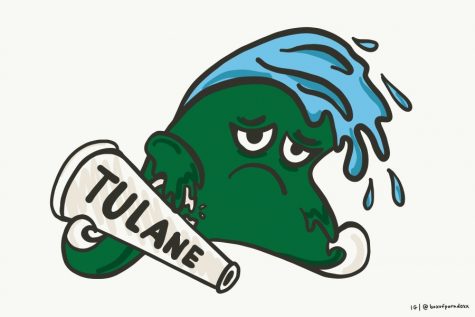Tulanians’ lack of school pride stems from misguided administrative efforts

“Only at Tulane, Only in New Orleans.” It is an ever-present rallying cry that Tulane has used to tout its role in the city’s redevelopment after Katrina. It has allowed the university to have a unique, mutually beneficial relationship with the city. However, it has contributed to a crisis of identity for Tulane and its students.
It is this semi-symbiotic relationship that has brought Tulane awards such as “Best College City.” The university highlights it as though it has a role to play in this. In reality, New Orleans is the best college city in spite of Tulane.
We do not truly “blend-in” with the city in the sense that we bring anything to the table. If the city were a potluck, we would be bringing the napkins. No amount of crawfish can bury the fact that Tulane culture is, to a very large extent, just co-opted New Orleans culture that we have taken for our own.
Tulane chooses to put so much of its image behind the city, yet, in the same breath, the administration is shocked to see that same image created our “work hard, play hard” culture that the students lean even harder into, a party culture that comes naturally to a college campus and is magnified by its celebrated nature in the big-easy.
There are positives and negatives to this “work hard, play hard” culture, which stems from Tulane’s utter lack of uniqueness from the rest of the city. This spiritlessness comes to a head in regards to a lack of involvement in campus engagement such as football games and other opportunities to display school pride, while celebrating a nationwide acknowledgement as a top party school.
In the end, neither notion is enough to rally student spirit, and inaction has only furthered our decline as a unified community.
As it stands, Tulane lacks many strong, defining characteristics that do not feel co-opted from the city, with that, has continued to struggle in its attempts to develop a cohesive campus culture.
In an article discussing Tulane and its relationship with the city, President Mike Fitts stated that the futures of Tulane and New Orleans are linked. While, yes, the needs of the city must match the needs of the university, the school must stand on its own feet in regards to identity.
There isn’t a quick fix that will create campus spirit at Tulane, but both the administration and student body can take a big step: continue to recognize our New Orleans influence but begin to encourage a centralized vision for what Tulane culture and spirit will become.
Leave a Comment
Your donation will support the student journalists of Tulane University. Your contribution will allow us to purchase equipment and cover our annual website hosting costs.



Caroline • Nov 28, 2018 at 9:02 am
I agree wholeheartedly with the author and with commentor above. Tulane’s total lack of diversity also plays a role.
Tim Brown • Nov 25, 2018 at 6:49 pm
I graduated in the late 90s and it was the same then as it is now. The one silver lining from Hurricane Katrina was a greater harmonious relationship between the school and city- which I believe fared well for a number of years. However, that seems to have reverted back to old times. I treasure both my time at Tulane and New Orleans and only hope that the two can find deeper connections other than geography as we move further from the post- Katrina era. Perhaps if Tulane opened itself up a bit more and brought IN more legitimate locals and culture to interact on a daily basis as opposed to “events” such as graduations and games rather than forcing outsiders into the city with required community service, the cultural relationship could be salvaged. One can only hope, only at Tulane and only at New Orleans.